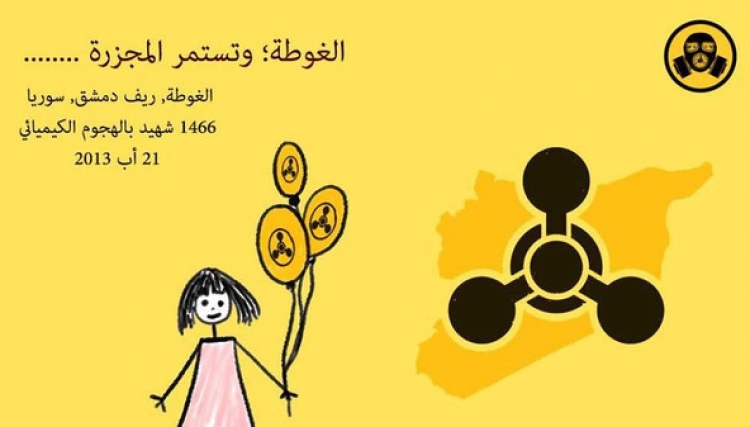Nour Martini, Baladi News
Sunday 21st of August 2016 marks the third anniversary of the chemical massacre, committed by the Syrian regime against unarmed civilians in the eastern and western Ghouta of Damascus countryside. This horrible massacre claimed the lives of 1,500 civilians, mostly women and children.
Baladi News recalls this painful anniversary and displays testimonies to some of the witnesses who came out alive from such a massacre and the subsequent massacres. The testimonies show the magnitude of the suffering endured by these people along with the torments they had witnessed.
Concerning that day's incidents, the young man "Qasim Ziadan" from the city of "Arbin", who is one of the survivals, said: "I was sitting in my apartment with some of my friends; suddenly, one of them said that he is suffocating and started coughing for five minutes which seemed to us at the beginning as if it was made-up, then we all started to feel the same till one of my friends, who is from the rebels, shouted "chemical attack"…then we all put a wet cloth on our faces".
Qasim continues narrating that terrible day and how they all committed to the instructions of that militant: "We were sitting in one of the basements; we immediately ran up to the second floor, then screaming started to increase in the street: (Chemical attack people! Is there any one here?). Here the cries of the paramedics started to sweep the streets; the mosques began to call the people to go up to the highest floors and put wet cloth on their faces". He added: "a mixture of sounds makes you feel horrified. My friends and I immediately went down and started knocking on the doors to rescue the wounded and we often had to break the doors to discover that the people of the house suffocated to death"…
"Qasim Ziadan" narrates how they carried the wounded and rushed them to the nearby points (Arbin, Duma, Hamouriyah), stressing that the share of Arbin was the largest in terms of the number of the emergency cases, then he continued saying: "about 4 o'clock in the morning I fainted in the medical point after I ministered a family, then I went into a comma till 6 pm and had a splitting headache till 12 o'clock next day. I was then told that our friend, Muhammed, who advised us to put a wet cloth on our faces passed away along with several others…". He pointed out that the following days of the massacre witnessed researching operations for the families and relatives among the graves and medical points.
"Akram Abu Tayiba", one of the workers in Arbin dispensary and who was documenting and archiving the injuries coming to its medical point, said: "I was documenting, taking photos, ministering, and even shrouding the martyrs. We have also documented 240 casualties in Arbin's hospital alone, including 88 martyrs of children, women and men". He went on saying: "This anniversary hurts me a lot, I try to forget it whenever it comes to my mind. Most of the casualties were women and children. The number of the survived children was very little. One man had 5 children aged between 7 -14 years, he lost 3 of them in the chemical massacre". He described the hysterical conditions suffered by people and the psychological shock they were in. He also said that a number of paramedics who were affected during the massacre fainted as a result and even lost their memory for a while.
"Amal", one of the paramedics, described the symptoms saying: "They were mainly: difficulty in breathing, redness in the eye as it was bleeding, sever cough, foams at the mouths along with hallucination in some cases, involuntary moves of hands and legs in others". Amal also explained that the severity of the condition differs according to the amount of gas inhaled; some of them died immediately, mostly children, while others ranged between highly dangerous conditions or suffocation cases that were treaded with difficulty.
Concerning the affected age groups, Amal confirmed that it was difficult to specify as the gas targeted all civilians whether children, elderly youth and women, even pregnant women, and the groups affected were mainly families.
Most of those who witnessed the "massacre of the century" in the eastern and western Ghouta of Damascus on the 21st of August, 2013 believe that the consequences of it have not finished yet as all the workers in medical field confirm that the region had witnessed an increase in cancer cases, the thing that was also confirmed by Amal who is currently working in the center of cancer and blood illnesses treatment, they also believe that there is a remarkable increase in the rates of embryos deformation cases considering this one of the most dangerous outcomes of the massacre.

